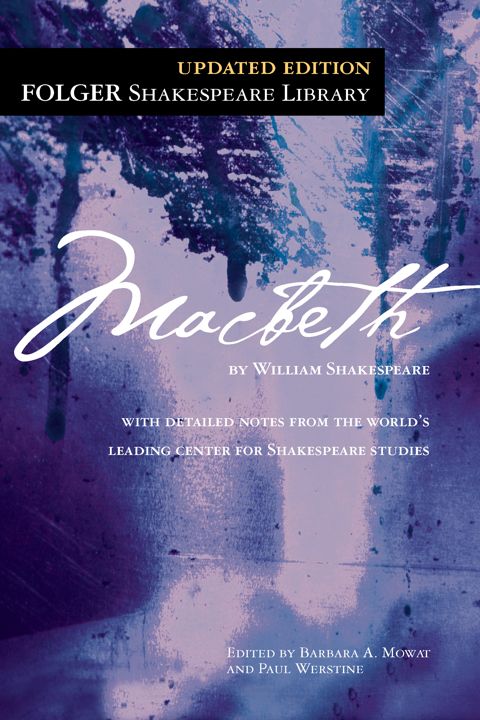Last updated on 2025/05/06
Macbeth Summary
William Shakespeare
Ambition's deadly path to power and madness.
Last updated on 2025/05/06
Macbeth Summary
William Shakespeare
Ambition's deadly path to power and madness.
Description

How many pages in Macbeth?
249 pages
What is the release date for Macbeth?
Set against the backdrop of 11th-century Scotland, William Shakespeare's "Macbeth" unfolds a harrowing tale of ambition, power, and the dark consequences of one man's insatiable desire. The story follows the valiant Macbeth, a noble warrior whose encounter with three prophetic witches ignites a relentless pursuit of the throne, setting off a chain of events that unravel his morals and sanity. As the line between fate and free will blurs, Shakespeare explores themes of ambition, guilt, and the supernatural, captivating readers with a gripping narrative that challenges the nature of destiny and the depths of human depravity. With its haunting imagery and complex characters, "Macbeth" remains a timeless exploration of the human condition that invites us to ponder our own ambitions and ethical dilemmas.
Author William Shakespeare
William Shakespeare, often referred to as the Bard of Avon, is widely regarded as one of the greatest playwrights and poets in the English language, born in April 1564 in Stratford-upon-Avon, England. His extensive body of work, which includes 39 plays, 154 sonnets, and two long narrative poems, spans various genres, from tragedies and comedies to histories and romances, reflecting the complexities of human experience and the nuances of societal norms. Shakespeare's unique ability to capture the depths of human emotion, coupled with his innovative use of language and memorable characters, has cemented his legacy as a timeless figure in literature. His works, including the tragic tale of ambition and moral decay in "Macbeth," continue to resonate with audiences around the globe, inspiring countless adaptations and interpretations across different artistic mediums.
Macbeth Summary |Free PDF Download
Macbeth
Chapter 1 | Textual Note
In Act 1 of "Macbeth," the play opens ominously on a blasted heath where three witches gather amidst thunder and lightning. They chant cryptically, hinting at their future meeting with Macbeth, declaring that "fair is foul, and foul is fair." The scene is set for chaos and moral disorder. As the action shifts to King Duncan's camp, we are introduced to Macbeth and Banquo. A wounded sergeant reports on the fierce battle against the traitorous Macdonwald, praising Macbeth’s bravery. Duncan rewards Macbeth with the title of Thane of Cawdor, as the former Thane has been executed for treason. The witches reappear and meet Macbeth and Banquo, greeting Macbeth with prophecies that he will become Thane of Cawdor and, eventually, King. Banquo, intrigued yet wary, is told his descendants will be kings. Macbeth is captivated and troubled by their words, pondering the implications. Macbeth receives confirmation of his new title from Ross and Angus, filling him with ambition and foreboding thoughts. Yet he is conflicted between destiny and morality, hinting at the dark thoughts taking root in his mind. Lady Macbeth is introduced through a letter she reads from Macbeth. She fears he is too kind to seize the crown and immediately begins plotting Duncan’s murder when she learns he is coming to their castle. In a chilling soliloquy, she calls upon spirits to make her more ruthless, promising to manipulate Macbeth to realize his ambitions. When Duncan arrives at Macbeth’s castle, he is greeted with hospitality, but Lady Macbeth’s intent is sinister. In a moment of weakness, Macbeth hesitates about the murder, but Lady Macbeth manipulates him, attacking his masculinity and ambition. Driven by her taunts, he resolves to go through with the plan. The act culminates in Macbeth's internal struggle over committing regicide. He is tormented by his imagination and doubts, but resolved by the end, he prepares to murder Duncan, sealing his fate in bloodshed. Themes of ambition, fate vs. free will, and the corrupting power of unchecked ambition are already woven throughout the acts, hinting at the tragic trajectory of the plot. Each character's motivations and dark aspirations contrast sharply with the noble ideals associated with kingship, setting the stage for the chaos to follow. The dark supernatural elements embodied by the witches echo the moral perturbations of the characters, forecasting a descent into madness and moral decay.
Chapter 2 | Macbeth on Film
In Chapter 2 of "Macbeth," James Bemis explores the enduring allure of Shakespeare’s play, highlighting its cinematic qualities and themes of ambition, evil, and moral decay. He notes that Macbeth's story, filled with violence and rapid action, resonates with modern audiences much like a horror film does, making it a popular choice for adaptation and performance. The commentary examines how the character of Macbeth epitomizes the tragic fall of a noble man who succumbs to dark temptations. Key scenes illustrate his transformation from a valiant warrior, respected for his bravery, to a tyrant consumed by guilt and madness. After hearing the witches’ prophecies, Macbeth grapples with his desire for power, leading to the murder of King Duncan, an act he undertakes with Lady Macbeth's chilling encouragement. Their ambitions drive them to commit heinous acts, resulting in the death of innocents, notably Macduff’s children, underscoring the theme of unchecked ambition and moral degradation. Furthermore, Lady Macbeth's character is meticulously examined. She embodies the determination and cruelty necessary to seize power but ultimately succumbs to overwhelming guilt and madness, resulting in her tragic demise. Her famous invocation of dark spirits to strip her of feminine weakness showcases both her strength and her eventual fragility. As the narrative unfolds, it paints a poignant picture of their downfall: Macbeth becomes a figure of despair rather than strength, symbolized by his profound nihilism in the face of Lady Macbeth’s death, culminating in his haunting soliloquy about life’s futility. Their tragic arc is completed with a climactic confrontation with Macduff, leading to Macbeth's end and the restoration of order in Scotland. Bemis concludes by reflecting on the existential themes present in the play, questioning whether contemporary interpretations fully grasp Shakespeare's deeper message about the dangers of ambition devoid of moral foundation. Ultimately, "Macbeth" serves as a cautionary tale about the perils of forsaking divine guidance in pursuit of personal gain, resonating as both a classic tragedy and a mirror to modern human struggles.
Chapter 3 | “Fair is foul, and foul is fair”: Macbeth as Morality Play and Discreet Exemplum
In Chapter 3 of Macbeth, Robert Carballo explores the intricate moral and psychological landscape of Shakespeare's dark tragedy, highlighting its themes of ambition, conscience, and the consequences of unchecked desires. Set against the backdrop of early 17th-century Scotland, the story revolves around Macbeth, a once-noble warrior whose encounter with three witches sparks an insatiable ambition for power. Initially celebrated for his valor in battle, Macbeth is soon tempted by the idea of usurping the throne after the witches foretell his future kingship. This prophecy awakens a deep-seated yearning within him, leading him down a treacherous path. Lady Macbeth, who revels in the prospective power that comes with regicide, becomes a pivotal influence on Macbeth. She embodies the ruthless ambition that contrasts sharply with Macbeth's hesitance rooted in his moral conscience. The tension between Macbeth's noble nature and his stirring ambition sets the stage for a profound moral conflict. Lady Macbeth's relentless push for Macbeth to seize the crown reveals her own darker desires, as she prays to be "unsexed" and filled with cruelty to commit the murderous act. As Macbeth grapples with the weight of his intentions, the significance of moral duty looms large. His internal struggle is characterized by reflections on the sacredness of his role as a host and kinsman to King Duncan, who embodies wisdom and virtue. The play skillfully illustrates the tension between ambition and morality; Macbeth is aware of the moral consequences of his potential actions, yet is increasingly lured by his wife's steely resolve and the intoxicating promises of power. Carballo emphasizes how the narrative serves as a cautionary tale about the nature of unchecked ambition and its corrosive consequences. As Macbeth succumbs to his darker urges, the balance of nature and societal order begins to shift ominously, mirroring his descent into moral chaos. The play’s imagery echoes this disruption, with nature responding to the disturbance in the moral order through dark omens and unnatural occurrences. Ultimately, Macbeth’s tragic journey encapsulates the interplay between noble intentions and the destructive potential of ambition, presenting a timeless exploration of human nature. The profound insights into the ethical dimensions of power speak not only to the context of Shakespeare's time but resonate profoundly in the modern era, serving as a sobering reminder of the perennial dangers posed by unbridled ambition and the significance of conscience in governance and personal integrity.
Key Point: The Dangers of Unchecked Ambition
Critical Interpretation: As you reflect on Macbeth's descent into darkness fueled by unchecked ambition, consider how your own aspirations are guided. This narrative encourages you to pause and evaluate the moral implications of your pursuit of success. It serves as a powerful reminder that, while ambition can propel you forward, it is crucial to balance it with a strong sense of ethics and conscience. With every step towards your goals, ask yourself: are you remaining true to your values, or are you risking everything for power? Let Macbeth’s tragic fate inspire you to cultivate integrity amidst ambition, ensuring that your desires do not lead you astray.
Chapter 4 | The Tragedy of Macbeth : A History Play with a Message for Shakespeare’s Contemporaries?
Chapter 4 of "Macbeth" dives into the intricate connections between Shakespeare's dark tragedy and the political and religious climate of his time. It begins by establishing how Shakespeare's works often reflect contemporary events, particularly the changes instigated by Tudor and Stuart monarchs. Notably, the chapter discusses the shift in religious policy during Queen Elizabeth I's reign and how it continued under King James I. "Macbeth" emerges as one of Shakespeare’s four great tragedies, written against the backdrop of the Gunpowder Plot of 1605 and the subsequent trial of the Jesuit priest Henry Garnet in 1606. Scholars suggest that these events influenced the play, which is marked by its themes of ambition, tyranny, and the dark consequences of unchecked power. Shakespeare’s portrayal of Macbeth as a villain is far more diabolical than the historical King Macbeth, reflecting the playwright's intention to address the nature of evil and tyranny in leadership. The chapter examines key figures like Macbeth and his wife, Lady Macbeth, who embody ambition and moral decay. Unlike the historical Macbeth, who initially served the king loyally, Shakespeare’s character murders Duncan, spurred on by the supernatural prophecies of the three witches and instigated by Lady Macbeth's ruthless ambition. Shakespeare’s construction of the characters highlights themes of gender, power, and psychological torment, as Macbeth grapples with guilt and paranoia following his ascent to power. Moreover, the chapter underscores Shakespeare's caution in tackling political themes amidst censorship. By setting his play in Scotland, he cleverly navigates the prohibitions against depicting contemporary English history while still making pointed critiques about leadership. The role of betrayal, particularly involving Macbeth's friend Banquo, also explores themes of loyalty and treachery. The discussion eventually alludes to the potential parallels between Shakespeare’s Macbeth and contemporary figures like James I, who had declared promises of tolerance towards Catholics that were not upheld. This reflection suggests that Shakespeare’s narrative isn't just about Macbeth's tragedy but serves as a broader commentary on the nature of power, the moral responsibilities of rulers, and the consequences of tyranny—mirroring the struggles faced by Catholics in Jacobean England. Lastly, the chapter concludes with an optimistic note about the eventual downfall of tyranny, personified in the resolve of Malcolm and Macduff to restore order and justice. The message that oppressive rule cannot endure forever resonates throughout the play, hinting at a hopeful restoration of virtue in governance, thereby allowing Shakespeare to engage his audience with historical reflections applicable to their own time while weaving a captivating literary narrative.
Key Point: The nature of unchecked ambition can lead to moral decay.
Critical Interpretation: As you reflect on Macbeth's descent into tyranny sparked by his and Lady Macbeth's insatiable ambition, consider your own life and aspirations. This narrative serves as a powerful reminder that ambition, when unbridled and devoid of ethical considerations, can lead to devastating consequences. Let Macbeth’s story inspire you to pursue your dreams with integrity and clear moral direction, ensuring that your ambition does not overshadow your values or the wellbeing of those around you.
Chapter 5 | Depraved or Determined? Macbeth and the Problem of Free Will
In Chapter 5 of "Macbeth," the exploration of the themes of free will and determinism takes center stage, diving into the character of Macbeth and his tragic journey. The text opens with a contemplation on life devoid of divine influence, likening it to "a tale told by an idiot," emphasizing the chaos and meaninglessness that would reign in such a reality. This philosophical lens sets the tone as we unravel the harrowing narrative of Macbeth, a play marked by bloodshed, darkness, and moral decay. The chapter highlights the stark contrasts within the play, particularly between Macbeth and Banquo, as both characters encounter the supernatural Weird Sisters. Their prophetic declarations catalyze Macbeth's ambition, pushing him towards regicide in order to claim the throne of Scotland. Yet even as the witches plant the seeds of ambition, a core question emerges: Are Macbeth’s heinous actions the result of fate or his own choices? This tension lies at the heart of the drama, challenging the idea of moral agency. The argument unfolds that although witches and Lady Macbeth influence him, ultimately, it is Macbeth who must consent to violence, plunging the dagger into King Duncan. Macbeth begins as a noble warrior but is slowly consumed by ambition and guilt, revealing the depravity that comes with unchecked desire. Lady Macbeth is equally ambitious, urging her husband to cast aside his doubts and embrace the darkness, reflecting the theme of moral corruption and complicity in sin. Her own descent into madness ultimately mirrors Macbeth’s moral decay, underlining the destructive power of their actions. Banquo, contrastingly, serves as a foil to Macbeth. He hears the witches' prophecies but remains skeptical and morally grounded, refusing to abandon his principles for power. His insouciance highlights Macbeth's transformation from a valiant hero to a corrupted tyrant, marking a tragic decline that strips him of his humanity. As the play unfolds, Macbeth's psychological unraveling becomes evident. The once-great hero is now a figure trapped in despair and nihilism, culminating in the chilling realization of life’s transience, articulated in his haunting soliloquy after Lady Macbeth’s death. The lines convey profound existential dread, as Macbeth reflects on life as "a walking shadow," ultimately echoing the emptiness of his choices and the futility of existence without moral grounding. The chapter concludes by reiterating that Macbeth must face the consequences of his actions alone, despite external pressures. His final moments reveal the stark reality of a world devoid of divine grace, a somber reflection on the consequences of choices made in darkness. This exploration of the interplay between free will and destiny emphasizes that, in the end, we are accountable for our actions. "Macbeth" thus serves as a powerful reminder of the moral complexities in the human experience and the imminent peril of unchecked ambition.
Key Point: The interplay between free will and accountability for one's choices
Critical Interpretation: Imagine standing at a crossroads, where every decision marks a fundamental shift in your life's path. In Chapter 5 of "Macbeth," you're reminded of the profound impact of your choices, especially when faced with temptation. Just as Macbeth wrestles with the seductive prophecies of the Weird Sisters, you too must confront the ambitions that tug at your soul. The stark realization that while external influences may steer you towards darkness, it is ultimately you who wields the dagger of choice empowers you to take control of your destiny. This chapter serves as a striking reminder that embracing moral agency can guide you towards a life where ambition is tempered with integrity, ensuring that your journey, unlike Macbeth's, resonates with meaning and purpose.
Chapter 6 | The Vision of Evil in Macbeth
Chapter 6 of "Macbeth," titled "The Vision of Evil in Macbeth," dives into the thematic and moral implications of evil as depicted through the characters and supernatural elements in the play. It opens with a striking portrayal of the witches, the "Weird Sisters," who embody malevolent forces. Their ominous presence, foreshadowed by thunder and lightning, introduces the notion that while they influence Macbeth’s fate, they do not instigate the initial actions of the story. Instead, they serve as catalysts for his latent ambitions, feeding off his human qualities to carry out their dark designs. Lady Macbeth's character emerges starkly as she aligns herself with the witches’ prophecies, driven by her ambition and desire for power. In her desperate invocation of evil spirits, she seeks to eschew the natural feminine constraints associated with motherhood. This yearning signals a willingness to abandon morality for personal gain, highlighting a theme of corruption that pervades the fabric of their marriage and society. As both Macbeth and Lady Macbeth wrestle with their own ambitions, they cross moral lines that result in horrific acts against their natural impulses and responsibilities. The text also illustrates how evil permeates the world around them, transforming the once-harmonious relationship between life and family into a battleground of treachery and betrayal. Banquo, initially depicted as loyal and noble, begins to succumb to the pervasive influence of evil as he grapples with his own ambition and the haunting prophecies. His transition, marked by internal conflict and a quiet acceptance of the chaotic order around him, illustrates how evil's insidious nature affects even the most steadfast characters. As Macbeth continues down his dark path, he becomes increasingly alienated from his own humanity. His encounters with supernatural visions and the haunting specter of Banquo serve as reminders of his moral decay. The struggle between conscience and ambition is palpable, as Macbeth grapples with guilt and the consequences of his actions, illustrating how he is consumed by the very evil he sought to control. The play takes a reflective tone as Macbeth contemplates the nature of evil itself. His acknowledgment of the chaos unleashed by his actions brings forth a deep sense of irony as he laments the loss of a more innocent and just world—one where evil could be clearly defined and perhaps even contained. Yet, as he slips further into tyranny, he becomes a figure of self-delusion, justifying his deeds while disregarding the inherent goodness that once guided him. The chapter concludes with a powerful commentary on the nature of evil as fundamentally nihilistic, stripped of meaning and purpose. Macbeth's existential recognition, particularly after Lady Macbeth's demise, starkly reveals the hollowness of his ambitions and the futility of his quest for power. The imagery of life as a "walking shadow," filled with "sound and fury," symbolizes a profound despair, echoing the larger moral lessons of the play about the destructive forces of unchecked ambition and the fragility of human integrity. Ultimately, “Macbeth” serves as a poignant exploration of human nature, evil, and the moral complexities that define the characters within its tragic framework.
Key Point: The Corruption of Ambition
Critical Interpretation: In your pursuit of dreams and aspirations, remember that unchecked ambition can lead you down a dark path, much like Macbeth's tragic descent into evil. Let the story remind you to balance your desires with moral integrity and the responsibilities you hold to others, for the pursuit of power at the expense of your principles can lead to a loss of humanity and deep despair. Embrace your ambitions, but anchor them in ethics and compassion, ensuring your actions uplift rather than destroy.










